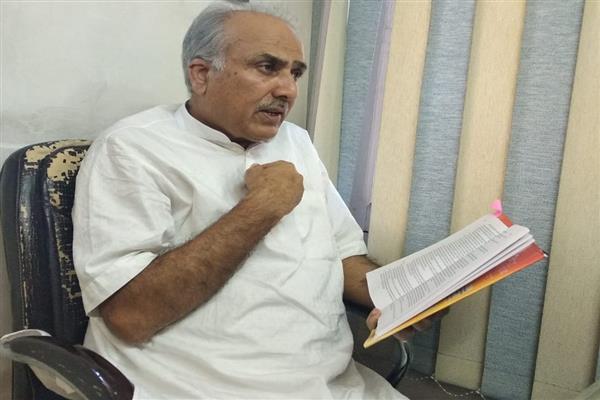Kashmir Magazine By : Kashmir Magazine | Srinagar, Publication Date: Wednesday, August 15, 2018 7:47:22 PM | Updated Date : Wednesday, August 15, 2018 7:47:22 PM

Justice Hasnain Massodi was a judge of Jammu and Kashmir High Court who is known for delivering some land mark judgments. The historical judgments for which he is known include No Reservation in promotion, No Suo-Moto Power to SAC, 370 is permanent.
Born on January 2, 1954 at Khrew District Pulwama, Justice Ghulam Hasnain Masoodi did his LL.B from Kashmir University and joined the Bar and practiced as an Advocate from April 22, 1977 to April 1980. Appointed as Munsiff on November 10, 1982 and promoted as Sub-Judge on January 3, 1987, thereafter Masoodi promoted as District & Sessions Judge on March 5, 1998.
He remained posted at different places as District & Sessions Judge besides posted Registrar Vigilance J&K High Court, Principal Secretary to the Chief Justice and Registrar General High Court of J&K. Hasnain Masoodi was granted selection grade in April, 2002 and placed in super-time scale in April 2008. Masoodi proceeded for Higher Education to the United States in 1992 and did his Master’s in Laws from Harvard University Massachusetts with constitutional, administrative, environmental and planning law as major subject areas.
He spoke to M Aslam Editor The Kashmir Magazine on the recent observations of the Supreme Court during a hearing on August 6 this year.
Q: The three judge bench of the Supreme Court headed by Chief Justice of India Justice Deepak Mishra in one of its observations said “we will only have to see SC will hear Attorney General Government of India as Jammu and Kashmir Government may not have much to say. J&K Government’s Counsel objected to it and so did additional solicitor General Toushar Mehta and Rakesh Devedi who said “state has a lot to say in the matter.” How would you like to respond to such observations from the Supreme Court of India?
A: I believe that the Jammu and Kashmir government has a primary role and has a lot to say during the proceedings on the petitions filed against article 35-A. As far as I understand the government of Jammu and Kashmir should not have made Municipal and Panchayat elections and appointment of an Interlocutor the ground for seeking deferment till a new popular government takes over. The Jammu and Kashmir Government should have told the Supreme Court that since the case on article 35-A concerns the sovereignty or limited sovereignty whatever you may call it, it is obviously clear that basic constitutional rights of the people are directly connected with the case filed against article 35-A and only a popular government can better safeguard the constitutional rights of the people. This could have been a strong argument for seeking deferment of the proceedings of the case till the formation of a new popular government in the state.
Q: Yet another observation of the three judge bench Supreme Court was that “we will have to see whether article 35-A goes against the basic structure of the constitution”. What are your views on this observation?
A: The constitutional mechanism put in place in 1950 defines relations of Jammu and Kashmir with Union of India. Article 370 of the constitution of India guaranteeing special status to Jammu and Kashmir has come into existence on its own force. It is clearly defined in the constitution of India that any provision of the constitution can be applied to J&K through a presidential order and if this law relates to defence communication and foreign affairs, the consultation of J&K Government but not its concurrence is must. As regards the case on article 35-A a constitutional bench of the Supreme Court in a case titled Puran Lal Lakhan Pal vs President and others has ordered “order of the president of India may be made applicable with exceptions and modifications and even omissions. A liberal interpretation of this Supreme Court judgment makes me to believe that president of India has the powers of even adding an article to the constitution of India.” Not only in this case but in yet another case titled Sampat Prakash vs state and others the observations of the Supreme Court are almost the same. In a land mark judgment a constitutional bench of the Jammu and Kashmir High Court has in the year 1956 in a case titled Mohammad Subhan vs state and others ordered “use of word exceptions shows that there was something more than which the president of India could do more than the power to omit.”
Q: What is the real issue before the Supreme Court of India as far as the petitions filed against 35-A are concerned?
A: I believe that the real issue challenged in the petitions filed against article 35-A is that whether president of India has the power to add an article to the constitution of India or not. I may recall it hear that article 370-1 (d) says “such of other provisions of this constitution shall apply in relation to that state subject to such exceptions and modifications as the president may specify by an order.” It clearly indicates that president of India has the power even to add an article to the constitution of India.